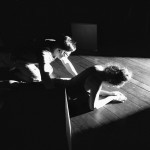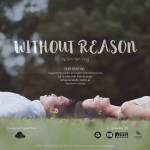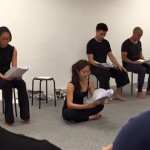
Reading-Presentation Details:
10 February 2015, Tuesday
7.30pm
Rehearsal Studio @ Centre 42
(Closed-doors, by invitation only)
-
The play After Gandhi – Sleeping Naked is inspired by a lesser-known aspect of the spiritual leader Mahatma Gandhi— his sex experiments in which he shared his bed with young girls to master his sexual drive. Gandhi explained that he was putting himself in sexually arousing situations in order to test his ability to resist sexual temptation. After Gandhi – Sleeping Naked is set in a dysfunctional family, where the father Bean models himself after Gandhi in pursuit of spirituality. Bean takes a vow of celibacy after having his first child, and starts sleeping naked with his daughter when she turns 10. Bean’s wife Mei Man doubts her attractiveness when her husband stops having sex with her. While she is forgiving towards her husband, she is jealous of her daughter who has the “privilege” of sleeping with her husband naked. Beverly and her three collaborators – Eng Kai Er, Vincent Chia and Doreen Toh – will be presenting a dramatized reading.
-
Beverly Yuan, Playwright, Co-director
Beverly obtained her Bachelor of Arts (Theatre Studies) from National University of Singapore, a Masters in Mass Communication and a PhD in Communication Studies from Nanyang Technological University. Together with Ang Gey Pin and a few other theatre practitioners, she co-founded Theatre OX and was a full-time performer with the troupe from 1995 to 1999. She trained for a year at Workcenter of Jerzy Grotowski and Thomas Richards in 1998. In 2001, Beverly founded In Source Theatre and was its Artistic Director from 2001 to 2013. She has directed and performed in more than 20 works with the company. She penned four full-length plays, namely D-evil of Light (English, 2001), I Dance I Wander I Wonder (English, 2004), Cage (Chinese, 2004), and Glowing Woods (2003), an English musical for a primary school’s opening. Beverly also performed in productions directed by various directors/choreographers. Among them were Bun & Stone (2010) directed by Lim Chin Huat and Tan How Choon, The Painted House II (2000) and The Painted House III (2000) directed by the late William Teo, Mr Beng (2000) directed by Kok Heng Leun, and Exodus (1999) directed by Jean Ng. From 2005 to 2007, Beverly spearheaded the practice-oriented research project Defining “Spiritual Theatre”: a Cross-cultural Study of Rituals and Traditional Body Forms in Singapore funded by a Research and Development Grant awarded by the National Arts Council.Eng Kai Er, Co-director & Actress
Eng Kai Er is an independent dance and theatre artist currently based in Singapore. In 2013/2014, Kai participated in Director’s Lab, a theatre directing mentorship programme organised by The Substation and presented Fish (2014) as a result of the programme. Prior to that, Kai was involved in various dance-theatre projects in Sweden / Europe where she lived from 2007 to 2012. She has worked on numerous collaborations with Sviatlana Viarbitskaya, such as House Hole (2010), a dance-theatre performance about a dysfunctional family, fPhD (2010), a fake thesis defense of a fake PhD degree, and The Pleasure of Eating Oranges (2013), a dance-theatre duet about love between two women, performed in Singapore, Toulouse, Berlin, Brussels and Stockholm in 2013/2014. Kai created a full-length solo performance, The Prayer (2012), commissioned by the M1 Singapore Fringe Festival 2012. The Prayer was subsequently shortlisted for the Outstanding Performance Award at Prague Fringe Festival 2012. Kai also performed in Mandala (2014) with In Source theatre. -
Artists’ Thoughts
Sex is a big part of many people’s life/mind. However, some choose not to speak about it or openly admit that sex plays a major role in their life. After Gandhi-Sleeping Naked explores what it means to desire sex and repress sexual desire. Is suppressing sexual desire a holy act as compared to engaging in legitimate sexual acts? Is sleeping naked with attractive bodies a way to curb desire or test one’s control of sexual urges? Does controlling one’s sexual urges illustrate that one is more enlightened and spiritual than the rest?
Even if one is indeed more spiritual than the rest, can even the most spiritual of us justify our actions when our behaviour affects others around us in a profound way? Reports recorded that the women in Ghandi’s life competed against each other for his attention and were often observed in emotional turmoil. This suggests some degree of unhealthy side effects on people other than Ghandi himself. Can everything be sacrificed – including other people’s wellbeing – in the search for greater spirituality of the self?
Today, there are those who believe that Gandhi’s sex experiments were valid spiritual endeavours and others who believe that his actions were inherently abusive. There are also some who contend that because of Ghandi’s role in India’s independence, he is a great man (and his sexual behaviour can be excused or accepted because of his greatness). How do we make our judgements and decide for ourselves, whether certain unusual behaviours are acceptable?
After Gandhi-Sleeping Naked looks into the conflicts between spirituality and physical indulgence; control and freedom; acceptance and denial, through three characters in the household.
Development Process
The script is developed together with the performers over three months from November 2014 to January 2015. While the playwright researched on the topics of celibacy and spirituality, records about Gandhi’s “Sex Experiments”, and developed the script from the perspective of dramatization, the performers explored the psychological state of the characters from the perspective of performing and characterization. The script is thus developed deeper with the discussions and exploration of the characters. This gives “soul”, “core” and “inner motivation” for the characters in the story. In addition, the actors brought in their affinity and association with the characters in the process of script development.
Some of the initial research materials include:
- Mahatma & Manuben: Newly discovered diaries of Gandhi’s personal attendant reveal how his experiments with celibacy changed her lifeCommenting on the diaries, psychoanalyst and scholar Sudhir Kakar writes: “So focused was the Mahatma on his own feelings during these experiments that I believe he may have ‘chosen’ to overlook their consequences for the women involved. Except for the flaring up of violent jealousy between the various women, we do not know the psychological effects, if any, that these experiments left on each of the women.Uday Mahurkar, India Today
- Sexual torment of a saint: A new book reveals Gandhi tortured himself with the young women who worshipped him, and often shared his bedThe teenage Abha was married to his great-nephew. Gandhi admitted that it was very dangerous sleeping close to her without wanting sex – but also conceded that it was a ‘very worthwhile experiment’.Glenys Roberts, Mail Online
Some of the playwright’s reading resources include Gandhi: Naked Ambition by Jad Adams and Sex and Power by Rita Banerji, and articles about sexual abuse by family members or people who are close to the victims:
- Man jailed for molesting daughter during massage (The Straits Times)
- 10 Ways To Talk To Your Kids About Sexual Abuse (Everyday Feminism)
- My dad, My lover (The Star Online)
- Woman admits to incest in first such case here (AsiaOne)
Other than the secondary research materials, the collaborators discussed about their experiences of sexual abuse as kids (by strangers or people who were close to them) and about how they affect their views towards relationship and the perception of self.
- Mahatma & Manuben: Newly discovered diaries of Gandhi’s personal attendant reveal how his experiments with celibacy changed her life
-





